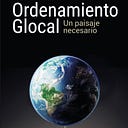“Glocal Ordering: A Necessary Landscape”. Tomás Loewy.
Dunken Publishing, 2023. tomasdarre@gmail.com
Progress will be glocal or it will not be
Introduction: writing a book is not like flipping a coin. It’s more akin to planting a seed in the ground, hoping it will germinate and grow. We’re not talking about economics; for that, you can just turn on the television. For issues neglected by mainstream media, a book is a valid resource. Faced with environmental crossroads and social polarization, it’s about installing new political agendas, social demands, and citizen agencies.
Current Context
Excesses: Symptoms — conjuncture — sectors
Deficiencies: Causes — long term — systems
One Idea Makes the Difference
Utopia is the beginning of all progress and the design of a better future. Anatole France
Glocal Ordering
Hybridization of territorial ordering, at a global scale, with dialectical and synergistic complementation between the local and the global.
“Glocal Aptitude”: attributes of sub-global and local systems that harmonize with global needs and vice versa. These relationships imply the validity of systemic and glocal sustainability.
Agenda for a Possible Future
Democracy (freedom, justice, and coexistence)
Sustainability (production and consumption profile)
Social Metabolism (society-nature integration)
World Population (stabilization)
Geodemography (population distribution)
Human Scale Development (small is beautiful)
Food and Environmental Security (access to)
Holistic and Glocal Management (new paradigm)
Cosmopolitanism (global governance)
Society — World (peace and future)
— — — — — — — — — — — — — — — — — — — — — — — — — — — — — — — — — — —
Synopsis
The convening theme is an exploration to make a world-society viable, from a different perspective. It is an attempt to incorporate glocal ordering as an approach to systemic interaction between the local and global levels. This criterion is presented as a universal and transversal reasoning for development processes. The ethical and cultural aspects are accredited to structure this idea, within an environment of democratic coexistence. A broad spectrum of context, diagnosis, and ongoing alternatives is included. The agri-food complex, the scale of production and the systemic sustainability are central. The location and relative autonomy of production-consumption are inherent to the landscape. The radical transformations contain traits of relocation, deconcentration and decentralization of human, political and economic components. A real case is also described, to exemplify the multiscalar content of local ventures. The essay includes objectives of cooperation and freedom, with food and environmental security.
